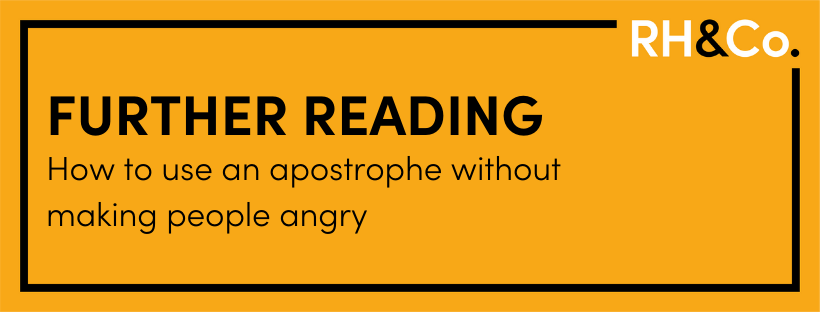

How to make your business writing less formal
Most of us learned to write at school, where we were taught to use a fairly formal style. Correct grammar, correct spelling, correct punctuation – there were rules, and there were exceptions, and that was that. You didn’t argue for fear of getting a ‘must do better’ note in the margin of your homework.
Some of us went on to learn other types of writing – fiction, poetry, journalism, copywriting – and with them different styles. As professional writers we learned to use more expressive language, a more conversational tone, to write with an audience in mind.
For many leaders in business, however, that formal style from school stuck around. Not quite academic writing but nevertheless dry, impersonal, often overly complex and difficult to read. And today, that’s no longer always appropriate.
How business language has changed
Language is not static. It evolves as society does. New words are added to the dictionary and old ones go out of fashion. Even rules of grammar shift.
In the past, business communication always erred towards more formal language but there’s no doubt that’s been changing gradually over the last decade or two. Now that virtually every business has a presence on social media, where communication has a deliberately human tone, we’ve remembered that even in B2B, brands have to talk to people as people.
Informal, conversational writing is effective because it feels more personal. As a result, we’re more likely to be drawn in by it and act on it. It’s persuasive in a way that formal writing usually isn’t. Just think about which one you’d rather engage with – a T&Cs document or an email from a friend.
So how do you go about making your writing more informal if it’s not your natural style? Here are our tips for improving your business writing abilities.

Use contractions
One thing you’ll notice if you listen to actual conversations is that we use a lot more contractions when we’re talking than we do when we’re writing.
A contraction is when you literally ‘contract’ or shorten a word or phrase by leaving out one or more letters and replacing them with an apostrophe. So can’t is the contraction of cannot and it’s is the contraction of it is.
The simple act of using more contractions in your writing will increase the conversational tone and reduce formality in a subtle and business-appropriate way.
Switch passive voice to active voice
Clear communication is the goal of any professional writer. Except a professional writer probably wouldn’t phrase that last sentence like that because it uses the passive voice.
Instead they’d write: every professional writer wants to communicate clearly. This uses the active voice, which makes it more energetic and engaging.
Here are a couple more examples:
Passive: Complex dosage instructions are often misunderstood by hospital patients.
Active: Hospital patients often misunderstand complex dosage instructions.
Passive: The waterfall development model is rarely used in startups these days.
Active: Startups rarely use the waterfall development model these days.
Because we’re more likely to use active voice in natural conversation, using it in most types of business writing will create a more engaging and readable tone.
The difference between ‘I wish to write in a more informal way’ and ‘I want to write in a more informal way’ is small but powerful.
Choose the right vocabulary
A key element for impacting formality in any sentence is the choice of vocabulary. The difference between ‘I wish to write in a more informal way’ and ‘I want to write in a more informal way’ is small but powerful.
So the first thing to do is to strip out any words or phrases that are too old-fashioned. Using ‘thrice’ when you could say ‘three times’ is unnecessarily formal. Ditto ‘endeavour’ instead of ‘try’ or ‘make your acquaintance’ instead of ‘meet you’.
And you can go a step further. There are plenty of words that we use in business writing almost without thinking, which could be replaced with more informal language. ‘Require’ could become ‘need’. ‘Request’ could become ‘ask’.
If there are two choices, go for the simpler option – the one you’d most naturally use in conversation. Not only does this make your business writing more informal, it also makes complex ideas easier to grasp at a glance.
Relax the rules of grammar
Formal writing follows formal grammar rules. Natural conversation usually doesn’t. So by relaxing the rules of grammar, your writing will inevitably come across as more informal.
This doesn’t mean you should start making up your own rules. But don’t be afraid to start a sentence with ‘and’ or ‘but’, or end a sentence with a preposition if you want to. The last sentence you read did both of these things, and it didn’t feel too casual, did it?

Try rhetorical questions
If you look back at the last sentence in the previous paragraph, you’ll see an example of a rhetorical question, which is something we use a fair bit in casual conversation.
Adding one or two into your writing can make it feel more personal and conversation. After all, if the author of an article asks you a rhetorical question, you feel like they’re talking directly to you, right? Just don’t put too many in or you’ll end up sounding like a broken record.
Use shorter sentences
Those writing with a formal tone tend to use not only big words but also long, convoluted sentences and complex sentence structures. Shorter sentences, on the other hand, make your writing more informal. They also make it easier for your reader to quickly grasp the meaning of what you’re communicating.
You can even use sentence fragments on occasion. Like this one. Or this. Like all rule breaking, just make sure you’re not overdoing it.
Add parentheses
Another way to make writing feel more conversational is to add a parenthesis. This is a word or phrase that is inserted into a sentence in rounded brackets (fyi, these are also called parentheses), almost like an afterthought.
How informal is too informal?
Of course, every organisation is different and there are many types of business writing. You’ll need to judge what is appropriate in your business context. Official letters might need a more formal style whereas day-to-day client communication might take a more informal style. Social media posts are likely to be more chatty than strategic business reports.
That’s where brand tone of voice guidelines or other communication style guides come in handy, giving everyone a framework against which to benchmark whether something is too formal or too informal. These guidelines should set out information about your target audience and how best to communicate with each sub-group.
As a general rule though, if you’re aiming for professional writing – even if you’re going for a relaxed, human tone of voice – it’s best to avoid swearing, slang terms or text speak like ‘lol’ unless you’re doing it deliberately to make a point. Likewise be careful to avoid spelling mistakes and other careless typos.
As with any creative subject, you need to know what the rules are, when you can break them and what effect breaking them will have.
Also remember that it’s not all or nothing. You don’t have to choose between academic writing and the language you’d use in everyday conversation with your mates. There are degrees of formality and you can dial your writing up or down depending on the circumstance. Just take a look at these three sentences:
- I look forward to receiving a response at your convenience.
- Looking forward to hearing from you whenever it’s convenient.
- Get back to me when you can.
If you want to know whether your writing has a conversational tone or not, try reading it out loud. If you feel silly or stuffy, there’s a chance you need to take a more informal approach with your writing style. The phrases that don’t sound natural out loud are the ones to work on. For more business writing tips, follow us on social or subscribe to The Right Words to get a fortnightly dose of creative ideas, content marketing advice and more.
Back to hompeage








